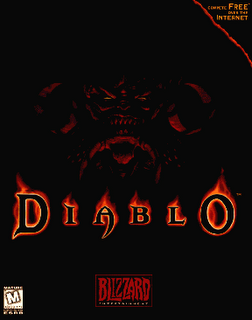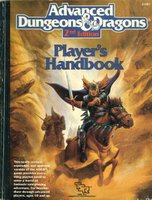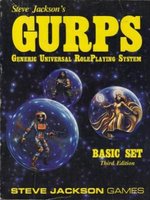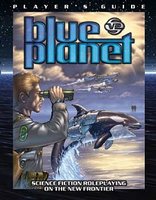
Sunday, January 31, 2016
Betty Crocker Cookbook #26: Skillet Calzon (pg. 525) - 160125

Wednesday, January 02, 2008
Blog Highlight: Other Blogs I'm Involved In
In addition, Random Battles is back on, so go there to see blogations about all things gaming. I'll be contributing there when I can, which will be less often than Carlo, since I take much longer to finish games than he does (I am less skilled) and I don't expect to be spending much time on my PS2 over the next few months, anyways. But good stuff will be there.
Saturday, September 15, 2007
Thursday, August 23, 2007
Proposal II and Car Wars
My first PhD committee meeting was this morning, at which my proposal (see previous post) was discussed, and much feedback was given and recieved. The formal, administrative part of the meeting was the Signing of the Form. My committee members all (there are three of them) APPROVED my proposal, but with the caveat that I need to revise it in line with their recommendations. This revision process is less structured than the basic process of the timing and composition of the meeting, so some of the stress has certainly come off - the hard deadline for the revision doesn't yet exist, just a promise to have it done in a "reasonable time frame"; I'll set a deadline for myself, rather than have one imposed from somewhere. So, overall, pretty good.
The revisions and recommendations of my committee were quite good, actually. Unlike the vibe I'm getting from some of the other grad-student-bloggers I read regularly (you know who you are), the advice I'm getting is mostly relevant and reasonable. Much of the focus of today's recommendations, for example, was on improving my PhD project with two practical goals: make my comprehensive examination committee happy this fall and make my research much more likely to be published in the peer-reviewed literature. I now have a fair bit of work to revise my proposal (essentially, I need to invert it, remove about 1/12 of it, and add perhaps two pages worth of "I will use X to do Y"), and it's been drilled into me that my PhD will be very hard work, very much a "full throttle" kind of project, but for the next couple of days I can perhaps not spend all my time at school obsessing over next summer's plans. Just most of my time.

Last post's comment thread somehow wandered down memory lane with a discussion about Car Wars and general geekiness. I'm going to expand on that here.
Car Wars is one of my favourite games. It's certainly no role-playing game (much more "roll-playing"), but it's also much more open and unstructured for reasonable comparisons to board games. It's perhaps most similar to minitures table-top wargames, and I believe it has been described as such by one or more of the game developers.
I'm just going to take a moment now and remember some of the good times I've had playing Car Wars.....
OK, I'm back. Anyway, for those unfamiliar, Car Wars is a game in which the players design their own combat vehicles (i.e. cars with guns) and fight against each other, often in arena combat within a well-defined space. It's a tactical wargame in that the strategy part all happens before play, in the choices players make in the design of their vehicles. The time frame is very stretched, such that one second (one turn) of game time can take upwards of 30 minutes of real-time to conduct.
A typical game of Car Wars might involve 4 players and a medium-sized arena, representing an area of land roughly equivalent to a football field. The arena is a piece of paper covered in 1 inch and 1/4 inch grid (faint 1/4 inch lines, heavier 1 inch lines); a map that represents the area of play. The cars are cardboard counters, usually 1 inch long and 1/2 inch wide, with a top-down view of a car. The details (beyond the size) of the counter don't matter; what matters is the design on paper that each player has. Given the number of options in car design, the possible combinations of body style, engine, wheels, weapons, armour and accessories rises to some stupid number. Obviously, a large portion of that combination-space contains illegal (e.g. engine not powerful enough) or simply poorly constructed (e.g. weak front armour) options. But the possible decent combinations are very large in number, and the "optimal" design cannot be predicted before play starts, since this is (in some respects) really a game in game-theory terms; the best decision a player can make at any given time depends to a large extent on the decisions made or possible decisions other players make.
Anyway, once everyone has figured out their cars, and placed them at the entrances to the arena or whatever pre-determined start locations and velocities have been agreed upon, play starts. Each turn represents one second of game-time, and is subdivided into five phases. At low speeds, most of those phases won't matter, but as the cars reach moderate and faster speeds, upwards of about 40 mph, every phase has something happening in it. The usual victory conditions are simply total victory - last car standing. Drive, shoot, crash, burn. Really, it's pretty straightforward. Decisions like loss of control at high speeds and whether one's machine-gun burst hits one's target are determined with dice rolls, with minimum roll for success modified by a long list of factors (e.g. it's harder to hit something that's farther away with a gun, so longer distances on the map inflict penalties in the form of raising the required minimum dice roll to-hit).
Hilarity ensues, when we're not arguing over the exact targetting conditions (I mentioned the list was long; off the top of my head I'd say there are perhaps 40 different factors that can influence any given shot, and a further 20 that might apply only in unusual circumstances). So, it's a pretty math-heavy kind of game, with almost every action accompanied by "roll, uh... 8 or higher" or similar. Computerization (the game was first printed in 1981) would be a huge advantage in Car Wars, but nobody I know has gotten the wherewithal together to put together a spreadsheet or something that will speed up play. I'm not asking anyone to computerize Car Wars (been done, reasonably well, long ago, but Car Wars is a huge potential play space, so...), I'm asking for a program that allows me to rapidly select options and have it tell me what I need to roll to blow my opponent's front-right tire off with my Vulcan machinegun at a distance of 10 inches. Or how many incendiary rockets I need to pump through that hole in his armour to set him on fire. Or how likely I am to roll my car and die taking that corner at 75 mph.
Monday, May 28, 2007
RPG - Part II: Games I've Played
In the early days of this blog, I started several 'theme' posts with titles that included things like "Part I". I guess I was short of ideas for posts back then, and set up for myself some recurring topics to keep things moving around here. Now, my problem is not so much lack of postable topics, it's lack of time and motivation (i.e. anger) to post interesting things.
One year ago today, I posted such a "Part I" topic, about Role Playing Games (RPGs). I think it's time to move on to part II.
I previously talked about games I own. Today, I'd like to talk about some of the RPGs I've played. The first RPG I ever played, as is true for many but not all gamers, was Dungeons and Dragons. I'm pretty sure my first play at that game was in the awkwardly-named Advanced Dungeons and Dragons, Second Edition, the venerable old cobbled-together-and-tacked-on-additions-galore system. I think I still own the basic rulebooks (Player's and Dungeon Master's guides) plus one version of a monster manual and some of the expansion books. I had lots of fun playing AD&D in various friends' basements during my highschool years, and I'd really like to get back in to regular role-playing, especially of some form of D&D.

I've played a little of the current version of the grand old franchise, Dungeons and Dragons 3.5. I don't own any of the books, so I'm less familiar with the rules than I was with second edition. What I've seen of it looks fun, and I think the basic flavour of the older versions - role-playing as opposed to roll-playing - has been more-or-less preserved. There's still lots of rules-lawyering and min-maxing, of course, but the switch to pretty much everything on a d20 looks like it removed some of the uber-otaku obsessions with differing probability distributions associated with d12 vs. 2d6 et cetera.

The d20 system has been expanded to other genres of RPG, including the Star Wars roleplaying system. That was great fun, too, when I played it for a few sessions in Victoria, years ago. The Jedi system in that game is pretty broken, in my opinion, but then it has to be or the whole game gets horribly unbalanced. In the movies, the Jedi are basically the be-all and end-all of characters - the only notable characters in the movies who don't have The Force are Han Solo and Boba Fett, both of whom spend most of their time on-screen interacting with Jedi or Sith (who are just Jedi with asshole powers). Still, a fun system, even if one does have to keep reminding the party's token Jedi that, as a 3rd-level character, they're still technically a teenager, so they should act more like whiny Luke or whiny Anakin (aside: how heritable is 'being a whiny little bitch'? Father and son in the movies have it in spades...) and less like old Obi-Wan. Anway...
I've also played one-off adventures in Rifts (back in high school, see my comment on Part I), and some weird every-character-is-an-inmate-at-a-mental-institution minor-publisher RPG at a game store a few years ago. The other players in that game were all long-time friends with each other and very familiar with the rules, so in-jokes and logic leaps I couldn't follow abounded. Not as much fun.
I can't think of any other RPGs I've played, though as I said in Part I I own rulebooks for several other systems, most notably GURPS and Blue Planet. I'd really like to expand the above list of games I've played, but I don't know how to go about finding other players around here, while simultaneously avoiding the horrible, horrible losers that are unfortunately so common in the RPG-playing world. It's called "bathing", guys...
Wednesday, January 31, 2007
Scholars & Students: The Academic RPG
I'm going to have to come up with a list of spells, too. Geek-honour demands it!
Sunday, November 26, 2006
Old Computer Games - Part II: Diablo
 After visiting Melanie's sister, brother-in-law, and indirect fitness a couple of weeks ago (short version: terrible driving weather), I decided to dig up my copy of the original Diablo, copyright 1996. We played a bit of Diablo II at a LAN store in Kelowna, and that was much fun.
After visiting Melanie's sister, brother-in-law, and indirect fitness a couple of weeks ago (short version: terrible driving weather), I decided to dig up my copy of the original Diablo, copyright 1996. We played a bit of Diablo II at a LAN store in Kelowna, and that was much fun.Wednesday, October 11, 2006
Computer Games I Like
He also posted a quickie top-3 list of best-games-ever:
In response, I commented on his blog, and left my quickie top-5 list:1. Star Wars: Tie Fighter
2. Sid Meier's Civilization
3. Sim City
1. Star Control II (yes, the sequel)I'll explain my choices here. But first, I'll point out that I only include games I've actually played - other games were probably better and/or more influential (nothing better than SC II), but I didn't personally meet them.
2. Civilization (the first one)
3. Battle of Britain (circa 1992)
4. Battlefield 1942
5. Ultima V
1. Star Control II
1992, Accolade
This is, in my opinion, the greatest computer / video game ever created. It's too bad this game wasn't somehow more influential on other game designers. I've never seen another game that I could point to and say "that game traces some key concepts to SCII". Regardless, SCII is at the top of my list because I had more fun playing that game than any other.
Wikipedia entry on the Star Control series here.
Incidentally, this awesome digital goodness is available for FREE DOWNLOAD because of some very, very nice people, who ported the 3DO version (with speech and other effects) into PC format and released it to the world.
2. Civilization
1991, Microprose
This game gets the number-2 spot because of the sheer quantity of time I spent playing it and its sequels (Civ II, Civ III, not yet Civ IV). I dunno, I guess I just really like god-games.
Wikipedia entry on Civilization (computer game) here.
3. Battle of Britain
1991? Accolade?
OK, I can't find any information online (in the time I'm willing to spend looking) about this game. Trust me, this marked the first (I'd ever seen) flight sim that showed more detail than green = ground, blue = sky, and darkline = enemy plane. So much fun shooting stuff...
4. Battlefield 1942
2002, Electronic Arts
Run around online and blow stuff up, real good. Except with some level of cooperation, and the ability for "the community" to post modifications, rendering the game more realistic (eg, realistic muzzle velocities for guns), less realistic (eg, increasing the available ammunition or vehicles) or just weird (eg, "monster truck now bigger!"). I never actually owned this game, but the few times I played it on other people's computers were great fun.
Wikipedia entry on Battlefield 1942 here.
5. Ultima V
1988, Origin
There had to be a role-playing game on the list, so this is mine. Enough said, I think.
Wikipedia entry on Ultima V here. My thoughts on this game here.
Looking at my list, I think I just dated myself (I'm 28, in case you didn't realise). So perhaps there is some nostalgia playing a role in the above list.
I also think I probably should have included Doom on the list, somewhere (below number 1, SCII is still better), given it's massive influence and popularity. Also funnitude.
Also, formatting this in Blogger's post editor was unusually painful, primarily due to the block quotes. Urgh.
Monday, May 29, 2006
RPG - Part I: Games I own
 I know it's Monday, and I know I'm 2 rants behind. But I'm just not that angry right now. Maybe in a couple of hours.
I know it's Monday, and I know I'm 2 rants behind. But I'm just not that angry right now. Maybe in a couple of hours.Anyways, buried in my ideas file, I have a note to myself that I could blog a bit about the Role-Playing Games (RPGs) I have played. I've actually only ever played one game - Dungeons and Dragons. But I own several more.
OK, nobody can really claim to be a gamer without owning, for at least a brief period, a D&D rulebook. I have a bunch of AD&D second edition books - Player's Guide, Dungeon Master's Guide, Complete Fighter, etc. This is the game that got me into gaming, even before I met the vast variety of good board and card games out there - those will be the subject of another post. I never played AD&D long enough with one group of people to have a character really get anywhere - the highest-level PC I ever had was a 7th level thief named "Silth-not-Filth", after a Sorcerer I had in Bard's Tale. Character names are usually haphazardly generated, for me at least.

Another set of rulebooks I own, but have never actually played, is GURPS. The name is somewhat silly, but simply stands for "Generic Universal Role Playing System", and apparently started as the temporary name of the in-house development at Steve Jackson Games. More about GURPS here.
I own about 30 GURPS books, all 3rd edition. Fourth edition just came out, but is horribly expensive - I don't blame the company for this, I blame my own lack of disposable income. Happily, with the release of 4th Ed, SJG has dropped the price on almost all 3rd edition stuff they have kicking around their warehouse to $10 per book - and they used to sell for about $25-$40. They produced somewhat more than 200 3rd Ed books, so there's lots to choose from. Not everything 3rd is marked down, though - some of the semi-autonomous stuff, like Transhuman Space, is still more expensive. Oh well.

The last "serious" RPG I have is Blue Planet. I saw this on the shelf of my local game store in Victoria years ago, and instantly decided that, as a biologist, I needed to own this game. I had to special-order it through Gerry (owner of the shop and himself worthy of a post or series of posts), but definately worth it. Perhaps the most interesting thing about this game, besides the background and setting, is the damage system. Most RPGs have some variant of "hit points", in which your character takes damage in an arithmetic fashion until critical junctions - such as zero - are reached. In Blue Planet, each attack rolls 3 dice, and the level of damage to the target is based on how many of those 3 dice end up under some critical value. The critical value is based on the power of the attack (eg, machine guns have higher base values than pistols) and the cover or armour of the target. Zero dice under the value means no damage, one means "light wounds" and some removal of capabilities of the target (slower movement, reduced sensory abilities, etc), two means "serious wounds" with rather large effects on the target (can't move, stunned, can't use hands, can't see, etc), and three means "critical wounds", and the target will die rather soon without major medical attention (ie, hospital ER). This is to simulate the fact that even a .22 can kill, and a .45 can cause a trivial wound, in rare cases.
I also have a couple of non-serious RPGs. Kobolds Ate My Baby relies on the BEER engine, and is designed to be as simple (and lethal to PCs) as possible - almost everything is just make-it-up-as-you-go, and a handful of important numbers. All hail king TORG!
Ninja Burger is from the same people as KAMB, and also runs on the BEER engine. I have never actually played either game, but the rule books are great fun to read.
Strangely, SJG also lists another game I have, Tribes, as an RPG. Again, I've never played that one, but I consider it much more of a board game than RPG. Another purchase, that, as a biologist, I needed to own.
Hopefully some day I'll find people to play these games with. *sigh*, the lament of the loney gamer.
Wednesday, May 24, 2006
Monday Rant (Terribly Delayed): Computer Cheating
Computer games, generally, do not suck. But many games share a common "feature", a coding-shortcut, that sucks, and sucks hard. This coding-shortcut manifests in a wide range of computer games as computer cheating. Apparently, programming the artificial intelligence of a piece of software to be relatively good, and forward-thinking, in just about any game is damn-near impossible. Fine, I know next to nothing about Computer Science and Artficial Intelligence, so I'm not going to rant about that difficulty. I am going to rant about the lazy bullshit programmers and game designers put into their games to compensate.
Computers are very good at certain things. Essentially, any task that can be reduced to lots and lots of calculations, will be something that a computer is good at, and a human not so much. The disparity between species in this realm is so great that nobody has bothered to create a game that explicitly takes advantage of this - with the possible exception of chess, invented long before the electronic compute.
This skill at calculation makes computers useful for entertainment purposes, as they can be used to simulate pretty much any experience, many of which make good games. More subtly, this makes computer players (as opposed to human players) very good at certain within-game tasks. For example, in any game simulating gunnery, the calculations involved in the simulated world for balistics and other factors important for shooting something are trivially easy for the computer - but relatively difficult for the human. So you get Idiot Savant computer players - it can't position it's units in the best ambush site, but if the human wanders within range, the human gets zapped. In games in which gunnery is of prime importance, such as First Person Shooters and many "arcade"-style games (think StarControl, or 1943), the computer player is typically a horrible moron, incapable of anything even resembling thought, but has accuracy rates up around 100%. Not good for simulating realism.
Other games require strategic (or at least tactical) thinking. God-games, like Civilization, and Real-Time-Strategy games (a misnomer; these games are universally Real-Time-Tactical) suffer the most from this. Computer players in these games typically seem to follow a basic, inflexible set of rules, to the point that most of the in-game features, like "diplomacy" and "long-term planning" are lost in a sea of automatic responses. All of the games in the Civilization series (NB: I haven't played Civ IV yet, but I'm not expecting an exception) have had this problem in a terrible way. "Construct alliances! Use diplomacy to win!" Bullshit. The computer always responds the same way: attack on sight.
So, to get around the inherent difficulty of programming a computer to think, game designers allow the computer to cheat. In shooter-type games, the cheating is obvious in the form of inhuman accuracy and a sense of timing that destroys the defintion of the word "reflex". In strategic games, the cheating must be inferred from the ridiculous achievments accomplished by the electronic idiot. Time to produce, the rate at which orders can be given, and perfect knowledge of one's opponent are all common strategy-game cheats by computers.
This brings me to the second part of my rant: games built with a sense of accomplishment.
Why do game designers make the computer cheat? Computers have no desires, no emotions. They don't cheat because they want to win, they cheat because they were told to. By game designers, many of whom apparently labour under the delusion that a game player, a human game player, plays a game for the sense of satisfaction, of accomplishment, achieved at the end of the game, or at key milestones within the game. NO. Fuck! I'm playing the game to burn some time - I'm fucking bored, not seeking a sense of self. I have work; this and my interpersonal relations will provide any needed sense of accomplishment - I play computer games to activate different regions of my brain, and to waste a few hours on a boring, boring Sunday. Repeating the same goddamn level 18 times, memorizing a particular and very specific series of button-presses, and reloading my saved game over and over and over and over does not contribute well to the "enjoyable time-wasting" aspect of computer games!
Stop fucking cheating! I just want to win; I don't care if you think it's too fucking easy! I WILL NOT look back on completing some game in a year with fond memories of triumph - I'll use other parts of my mind for that (probably the parts most affected by alcohol, actually). Why, oh why, can't I find a game that lets me accomplish my goal of something-to-do-while-dinner-cooks!?!?!?!
Arg.
OK, not my greatest rant, and delayed by 10 days. I'll try to work up a bit of froth again this week, so I'm can get back on schedule next week.
Wednesday, May 10, 2006
Snake!

In the interests of moving that stupid-formatting-error light sabre post off the main page of this blog, here's another short and useless post.
I waste lots of time. One of the ways I do this is by playing online flash games. High entertainment, they are not.
Anyways, one of my current favourites is "Snake", which I play here. I think I had this game, perhaps under a different name, on the Commodore 64 I had (my parents had) when I was a child.

